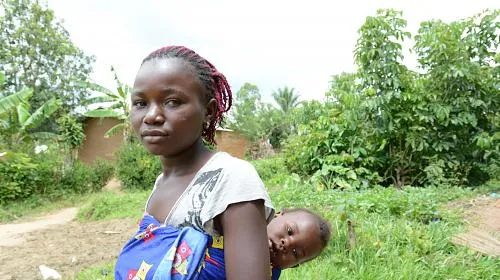BENI, Democratic Republic of the Congo (Sept. 25, 2018) – Clashes between the national army and an armed group, which killed 18 people and injured 8 here over the weekend, have forced aid groups to suspend parts of the Ebola response, highlighting how difficult it is to contain the first outbreak of the deadly virus in a war zone.
Ebola has now claimed at least 100 lives in the northeastern part of the Democratic Republic of Congo (DRC). Meanwhile, the total number of people infected continues to grow, reaching 150 on Monday.
“This attack and similar clashes pose serious security threats to the local population. In addition, they affect the ability of humanitarian agencies to respond to the outbreak,” says Dr. Saad El-Din Hassan, CARE’s team leader for the Ebola response in Beni, DRC. “Our scheduled interventions to support infection prevention and control were put on hold to mourn the lives lost and due to the security situation in Beni.”
Despite earlier reports of the outbreak being contained and cases decreasing, numbers are still growing by the day, including more cases confirmed Monday. As in most humanitarian crises, women and girls are bearing the brunt. They are most often primary caregivers and, as a result, represent more than half the Ebola cases in this outbreak. Security threats remain a major risk, making it difficult to access remote communities and preventing swift containment of the highly contagious disease.
“Some communities are losing hope and feeling exhausted after several years of violence around the city,” says Dr. Eric Mukama, CARE’s health specialist in Beni. “That, combined with the lack of proper awareness among the society, mean than many refuse to even accept that there is a disease such as Ebola. They see people going to the hospital and dying there, so they are worried to go to the hospital and prefer to stay at home, even when they have Ebola symptoms. The affected areas suffer from the lack of a proper infrastructure. In order to avoid Ebola, much like many other diseases, infection prevention and hygiene come first. Yet, significant numbers of these populations do not have access to basic water and sanitation services.”
Over 1 million people are living in the districts of Beni, Mabalako, Oicha, and Mambasa, where there have been confirmed cases, and communities are under the risk of contamination.
CARE supports the government’s joint Ebola virus disease (EDV) response plan, focused on filling the critical water, sanitation, hygiene and food insecurity gaps at the household, community and health center levels, and supporting risk communication, social mobilization and community engagement. CARE supports health centers and schools around the affected areas with water supply and personal protection equipment, as well as providing training to health staffs on preventive measures for Ebola. Additionally, CARE distributes dignity kits for women and girls. They contain soap, hand sanitizers, disposable sanitary pads, underwear, loincloth, razors and plastic buckets. CARE also promotes the prevention of sexually-transmitted diseases at health centers, and actively supports community engagement and social behavior change communication.
The Ebola epidemic is not new to the DRC; this is the tenth outbreak in the country’s history, which is why the ministry of health is leading the response with the support of local and international aid organizations. Nevertheless, this is the first Ebola outbreak in the country to happen in a conflict zone. Attacks like that of Saturday night, combined with general, ongoing security threats, make it more challenging for the government and humanitarian actors to contain the outbreak.
CARE has been working in DRC since 1994, initially responding to a refugee crisis following the Rwandan genocide. Prioritizing the prevention of the Ebola expansion, our team in DRC takes part in the daily coordination meetings with the bodies responding to the epidemic, such as the ministry of health, UN agencies, and other humanitarian organizations, including local Congolese organizations. CARE is assessing how to best scale up its response to reach more of those affected, especially women and girls, so this outbreak can be slowed and eventually stopped.
ABOUT CARE
Founded in 1945, CARE is a leading humanitarian organization fighting global poverty. CARE has more than seven decades of experience helping people prepare for disasters, providing lifesaving assistance when a crisis hits, and helping communities recover after the emergency has passed. CARE places special focus on women and children who are often disproportionately affected by disasters. Last year, CARE worked in 94 counties to reach 80 million people, including more than 11 million through emergency response and humanitarian aid.
Media Contact: Nicole Harris, nharris@care.org 404-735-0871

